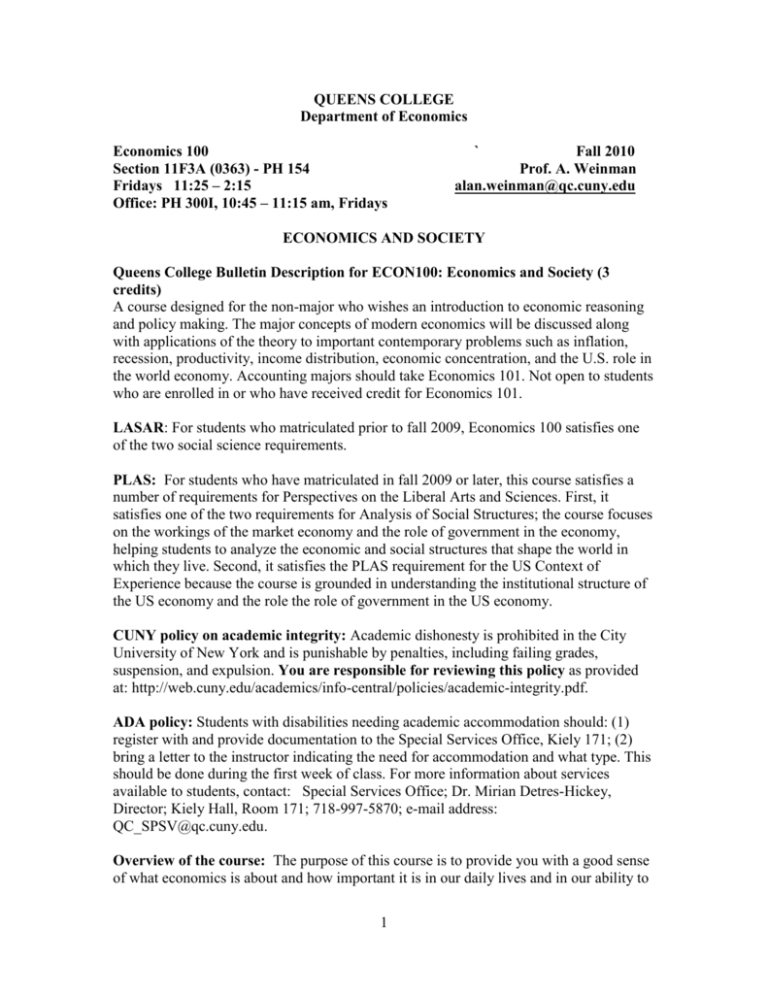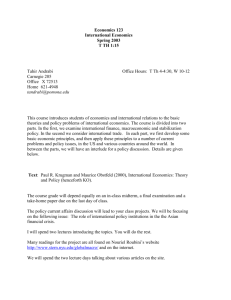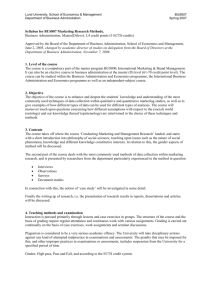
QUEENS COLLEGE
Department of Economics
Economics 100
Section 11F3A (0363) - PH 154
Fridays 11:25 – 2:15
Office: PH 300I, 10:45 – 11:15 am, Fridays
`
Fall 2010
Prof. A. Weinman
alan.weinman@qc.cuny.edu
ECONOMICS AND SOCIETY
Queens College Bulletin Description for ECON100: Economics and Society (3
credits)
A course designed for the non-major who wishes an introduction to economic reasoning
and policy making. The major concepts of modern economics will be discussed along
with applications of the theory to important contemporary problems such as inflation,
recession, productivity, income distribution, economic concentration, and the U.S. role in
the world economy. Accounting majors should take Economics 101. Not open to students
who are enrolled in or who have received credit for Economics 101.
LASAR: For students who matriculated prior to fall 2009, Economics 100 satisfies one
of the two social science requirements.
PLAS: For students who have matriculated in fall 2009 or later, this course satisfies a
number of requirements for Perspectives on the Liberal Arts and Sciences. First, it
satisfies one of the two requirements for Analysis of Social Structures; the course focuses
on the workings of the market economy and the role of government in the economy,
helping students to analyze the economic and social structures that shape the world in
which they live. Second, it satisfies the PLAS requirement for the US Context of
Experience because the course is grounded in understanding the institutional structure of
the US economy and the role the role of government in the US economy.
CUNY policy on academic integrity: Academic dishonesty is prohibited in the City
University of New York and is punishable by penalties, including failing grades,
suspension, and expulsion. You are responsible for reviewing this policy as provided
at: http://web.cuny.edu/academics/info-central/policies/academic-integrity.pdf.
ADA policy: Students with disabilities needing academic accommodation should: (1)
register with and provide documentation to the Special Services Office, Kiely 171; (2)
bring a letter to the instructor indicating the need for accommodation and what type. This
should be done during the first week of class. For more information about services
available to students, contact: Special Services Office; Dr. Mirian Detres-Hickey,
Director; Kiely Hall, Room 171; 718-997-5870; e-mail address:
QC_SPSV@qc.cuny.edu.
Overview of the course: The purpose of this course is to provide you with a good sense
of what economics is about and how important it is in our daily lives and in our ability to
1
understand government policy. Economics is far broader than most people realize.
While it has implications for business activity, it is relevant for all of us in the decisions
we make as members of households, as participants in the world of work, and as voters.
We examine the basic tools of economic analysis and apply them to a variety of public
issues, such as unermployment, economic growth, efficiency and inefficiency, and the
position of the United States in the global economy. We study the role of the Federal
Reserve in applying monetary policy and the federal government in applying fiscal
policy. We also engage in supply and demand analysis and examine price elasticity of
demand and other elasticities.
One desirable outcome of this course is that it may encourage you to study more
economics – and even may convince you that it is fun. Another is simply that you feel
more comfortable with, and more interested in, economic issues that you will be
confronting in your daily life and as an informed citizen of the US or any other nation.
Specific Learning outcomes:
Upon successful completion of this course, you will be able to:
Use supply and demand analysis to predict or evaluate the effects of government
policies or other events on society’s allocation of resources.
Understand the macroeconomy: what shapes GDP, how is money “created.” what
can lead to economic downturns or to inflation (or deflation), what are the actions
government can take to address these problems?
Understand microeconomic issues; how households and firms make decisions;
the workings of competitive and non-competitive markets.
Understand relationships between economics, other social sciences, and
mathematics.
A few words as to my teaching philosophy: I try to demonstrate throughout the semester
the relevance of economics to our daily lives. To that end, I report the latest economic
data each session. Such data include the growth rate of our economy, unemployment,
inflation, currency exchange rates and the prices of key commodities, particularly oil.
Homework Assignments: During ten weeks of the semester, students are assigned
one from The Wall Street Journal. The assignment consists of answering in essay
format three to five questions concerning each article.
Term Project: Students are responsible for completing ten Wall Street Journal
assignments during the course of the semester (see “Homework Assignments”
immediately above). These are maintained in a portfolio and constitute the term
project.
Examinations: There will be two examinations, non-cumulative, during the semester.
The midterm exam will be on Friday, October 8. The final exam is tentatively set for
December 17.
2
Grade determination:
Midterm examination:
Final examination:
Term project/class participation
contribution to semester grade
1/3
1/3
1/3
Office Hours: If you have any questions or problems or wish to discuss something with
me outside of the classroom, please feel free to see me during the office hour listed
above. If this is not convenient, we can arrange an alternate appointment. If you have
questions about class or assignments, you can e-mail me at alan.weinman@qc.cuny.edu.
Remember to include your name in your e-mail.
Required book: The textbook for the course is Economics, a Tool for Critically
Understanding Society (9th Edition) by Riddell, Shackelford, Stamos, and Schneider,
published by Pearson/Addison-Wesley, 2010.
Reading assignments: See below.
Class Schedule
Dates
Reading Assignments
8/27
9/3
9/14
9/25
10/1
Overview of Economics
The Emerging Global Economy
Scarcity
Evolution of Economic Systems
Adam Smith, Division of Labor
10/8
Midterm examination
10/15
10/22
10/29
11/5
11/12
11/19
12/3
12/10
The Theory of Markets
Perfect Competition & Efficiency
Noncompetitive Markets & Inefficiency
The Economic Role of Government
Macroeconomics: Issues & Problems
Unemployment, Inflation, & Stabilization
Fiscal Policy: Government Spending & Taxation
Review
12/17
Final examination (tentative date)
3
Chapter 1
Chapter 19
Chapter 6
Chapters 2, 5
Chapter 3
Chapter 7
Chapter 8
Chapter 9
Chapter 12
Chapter 13
Chapter 18
Chapter 15







